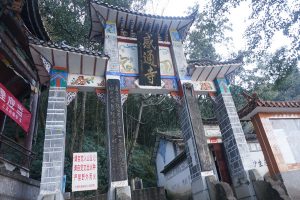
Manglu Mountain in Lincang
Manglu Mountain: A Historical Overview
Manglu Mountain忙麓山 is an eastern extension of the Da Xue Mountain range near the Lancang River in Lincang. It backs onto Xigui Mountain and stretches eastward to the Lancang River. At its foothills lies the Xigui Ferry, formerly known as Gali Ancient Ferry. Due to its unique geographical position, Manglu Tea is known by three names: Manglu Tea, Xigui Tea, and Gali Ancient Tea. Historical accounts vary in their Chinese characters for “Manglu,” including variants like “Manlu,” “Manlv,” “Mangliu,” “Manglu,” and others.
Geography and Tea Cultivation
The Manglu Mountain road extends 24 kilometers from the Linbang Highway, reaching elevations between 740 to 950 meters above sea level and located about 10 kilometers from the Dachao Mountain power station. Tea gardens thrive in the subtropical monsoon forest halfway up the mountain, scattered amid the forests. The tea trees exhibit varied growth patterns, with some orderly arranged while most grow irregularly, reaching heights of three to six meters. Some trees feature thick new growth from stubs of their trunks. The bases of large tea trees measure around 80 to 90 centimeters in diameter. These gardens boast traditionally harvested tea, where branches curl upwards naturally over centuries, forming shapes resembling reclining dragons or soaring birds. This unique growth pattern not only facilitates easy harvesting but also adds aesthetic value, making them exemplary ancient cultivated tea gardens.
Historical and Cultural Significance
Manglu Tea holds significant cultural heritage. In Manglu Mountain, sites include old residences of Manglu Tea farmers, the nearby Xigui Neolithic site, and remnants of the Gali Ancient Ferry and Tea Horse Ancient Post Road at the mountain’s base. Situated on the west bank of the Lancang River, Manglu Mountain has a longstanding tradition of cultivating tea known for its exceptional quality, owing to its unique geographic and historical conditions, which once brought it great renown.
Expert Endorsement and Tea Evaluation
Experts such as Chen Zongmao, academician of the Chinese Academy of Sciences and chairman of the China Tea Association, and contemporary tea master Wu JueNong agree that the birthplace of tea worldwide lies in the Lancang River basin. The most suitable environment for tea growth spans both banks of the Lancang River, with the finest tea varieties found in areas like Shuangjiang, Lincang, Yun County, and Fengqing in Lincang City, as well as in Simao and Xishuangbanna. Manglu Mountain, on the west bank of the Lancang River, benefits from a unique natural environment characterized by a moderate climate, extensive forest cover, and enveloping sea of clouds from the Lancang River. Its east-facing slope, with short sunlight exposure and diffuse light, combined with ample rainfall, high humidity, and loose, humus-rich soil, provides ideal conditions for tea trees to thrive, resulting in robust plants with thick, firm leaves—the cornerstone of Manglu Tea’s exceptional quality.
Scientific Validation and Tasting Notes
In 1982, the National Agricultural Sciences Academy Tea Research Institute and Yunnan Provincial Tea Research Institute confirmed that Lincang’s tea varieties belong to the Yunnan large-leaf population. Manglu Tea, a typical representative of Bandong tea, epitomizes the essence of Bandong tea. Tasting Manglu Mountain Tea with its spring water, locally known as “Sheep Liver Stone Water,” is essential for experiencing its best flavors. This water enhances the tea’s maturity, diminishing bitterness while maintaining a lasting aftertaste and refreshing sensation in the throat and mouth. Even after consuming plain water, the tea’s sweet aftertaste lingers, akin to the lingering sweetness after eating olives, making it a truly delightful experience. Manglu Tea is distinguished by its mellowness, moisture, and enduring aroma, remaining refreshing through multiple infusions, devoid of bitterness or astringency—an ideal choice for those new to raw tea. Its dominant character gradually becomes apparent, making other teas seem less appealing, akin to the sentiment of “returning from Huangshan without admiring its peaks.”

 7 Days GolfingTour
7 Days GolfingTour
 8 Days Group Tour
8 Days Group Tour
 8 Days Yunnan Tour
8 Days Yunnan Tour
 7 Days Shangri La Hiking
7 Days Shangri La Hiking
 11 Days Yunnan Tour
11 Days Yunnan Tour
 6 Days Yuanyang Terraces
6 Days Yuanyang Terraces
 11 Days Yunnan Tour
11 Days Yunnan Tour
 8 Days South Yunnan
8 Days South Yunnan
 7 Days Tea Tour
7 Days Tea Tour
 8 Days Muslim Tour
8 Days Muslim Tour
 12 Days Self-Driving
12 Days Self-Driving
 4 Days Haba Climbing
4 Days Haba Climbing
 Tiger Leaping Gorge
Tiger Leaping Gorge
 Stone Forest
Stone Forest
 Yunnan-Tibet
Yunnan-Tibet
 Hani Rice Terraces
Hani Rice Terraces
 Kunming
Kunming
 Lijiang
Lijiang
 Shangri-la
Shangri-la
 Dali
Dali
 XishuangBanna
XishuangBanna
 Honghe
Honghe
 Kunming
Kunming
 Lijiang
Lijiang
 Shangri-la
Shangri-la
 Yuanyang Rice Terraces
Yuanyang Rice Terraces
 Nujiang
Nujiang
 XishuangBanna
XishuangBanna
 Spring City Golf
Spring City Golf
 Snow Mountain Golf
Snow Mountain Golf
 Stone Mountain Golf
Stone Mountain Golf

















